

Events come in many sizes, forms, and shapes. But no matter what the event, they take a lot of resources to plan, manage and execute. It isn’t as straightforward as stating the intent of the event and it gets done, there are a lot of moving parts to manage it.
Curating and managing events is important for a brand to gauge the willingness of an existing or prospective audience to associate with a brand. The objectives can range from showcasing something to new launches, educational events, and social events.
Measuring success
The one thing that needs to be in consideration for all events, however, is the ability to gauge the success of the event. This not just validates the resources allocated towards the event but also to better upcoming events!
Imagine you’ve just completed a major global event for over 10,000 attendees. You think the cocktail mixer night was a big downer and no one enjoyed it. Conducting the event satisfaction survey, however, portrays a different picture of that being the star of the event.
Imagine having a negative idea about the most successful attribute of the event! And this insight would only be uncovered on actually creating a survey format template and deploying it to the audience.
Hopefully, your post-event feedback is as important an activity as the event itself!
QuestionPro has just the perfect event feedback survey template that you can use or tailor to your specific needs.
We’ve listed out 18 excellent event satisfaction survey templates by some big brands globally for you to peruse and get inspired, by:
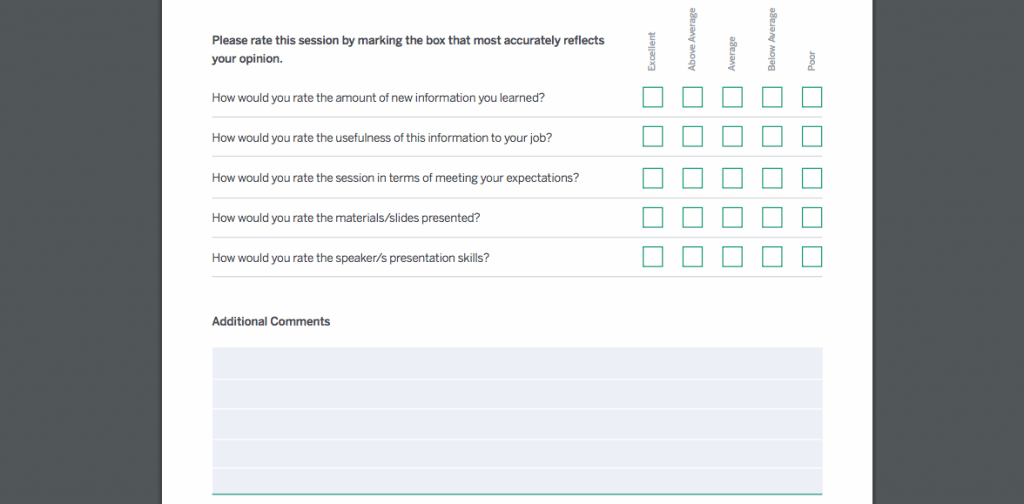
EventBrite facilitates learning in the form of events. A major part of what they do is educate people. And due to that, it is imperative to conduct a post-event satisfaction survey to understand what worked and what didn’t.
The above template is administered to participants of a learning event. This helps Eventbrite to get a better understanding of the speaker that taught the course, the course materials, use of teaching aids and usefulness of the information learned. Using a rating scale from poor to excellent provides an insight into each aspect of the course so that immediate tweaks can be made to make the course more effective. Asking an open-ended question at the end of the survey allows the respondent to throw more light on their answers and also allows Eventbrite to collect actionable information. This simple but effective template also aids with understanding how referenceable a course is to an attendee. This satisfaction survey template is a perfect example of a simple but scalable and effective template that any brand could use.
LEARN ABOUT: Event Surveys
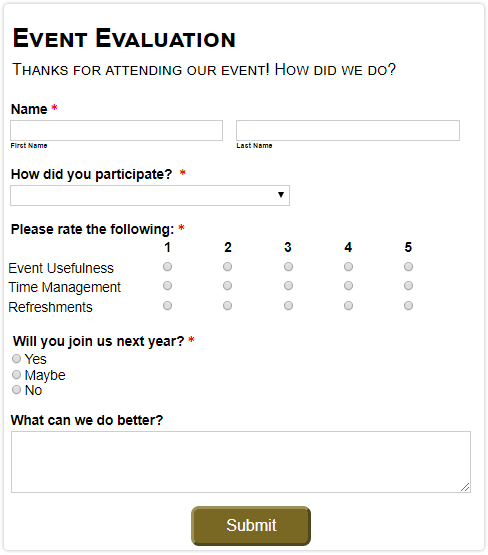
SimplyCast is known for their engagement platform and hence have an ethos and DNA of continued engagement. This event evaluation survey that they administer to attendees is to purely know how they did and thank participants for being there.
A major characteristic of this template is the ability to directly ask people if they will return to the event next year on the basis of their experience of this and all past events. Depending on the answer to this question and the subsequent open-ended question, SimplyCast acts quickly to put in place a corrective plan of action to coerce attendees that have said no, provide engaging content to the attendees that said maybe and fortify on what they did right with the attendees that replied, yes.
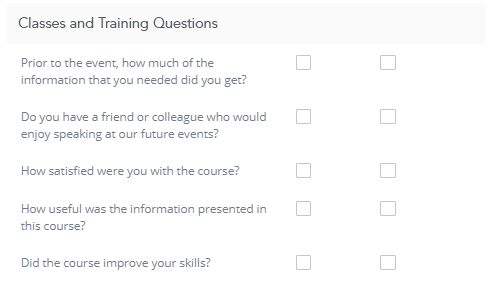
EventZilla is another event aggregator and facilitator platform. Various types of events and learning can be conducted through the platform. In the above survey, attendees are asked to respond to the effectiveness of classes and training sessions.
This questionnaire collects information from the attendee about how effective the course was, did the course improve their skills, did the course accentuate their knowledge from before and so on. Another important element of this course is the ask for references. Sometimes attendees prefer certain subject matter experts in their field of learning and can connect the course to these experts and vice versa as a medium for teaching. In a very simple format, EventZilla collects a lot of relevant information from the customers.
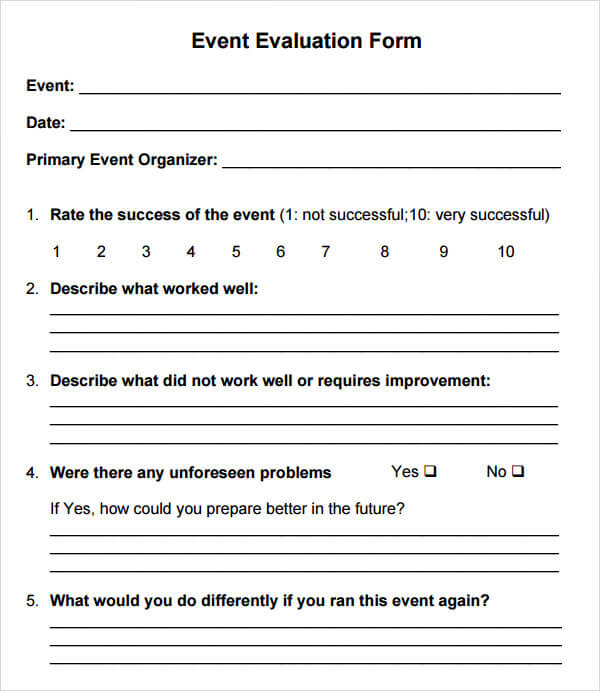
Vientazona provides a comprehensive survey template that uses a simple rating question and then open-ended questions. This type of post-event survey can be used when there is a need to collect in-depth information. While these surveys aren’t very common, they provide a detailed insight into the mind of the attendee and provide concrete actionable information.
Using this template allows Vientazona to give a direct insight into the mind of the respondent and also feedback into what was good and what was not. This completely takes off the aspect of guesswork and solves actual problems.
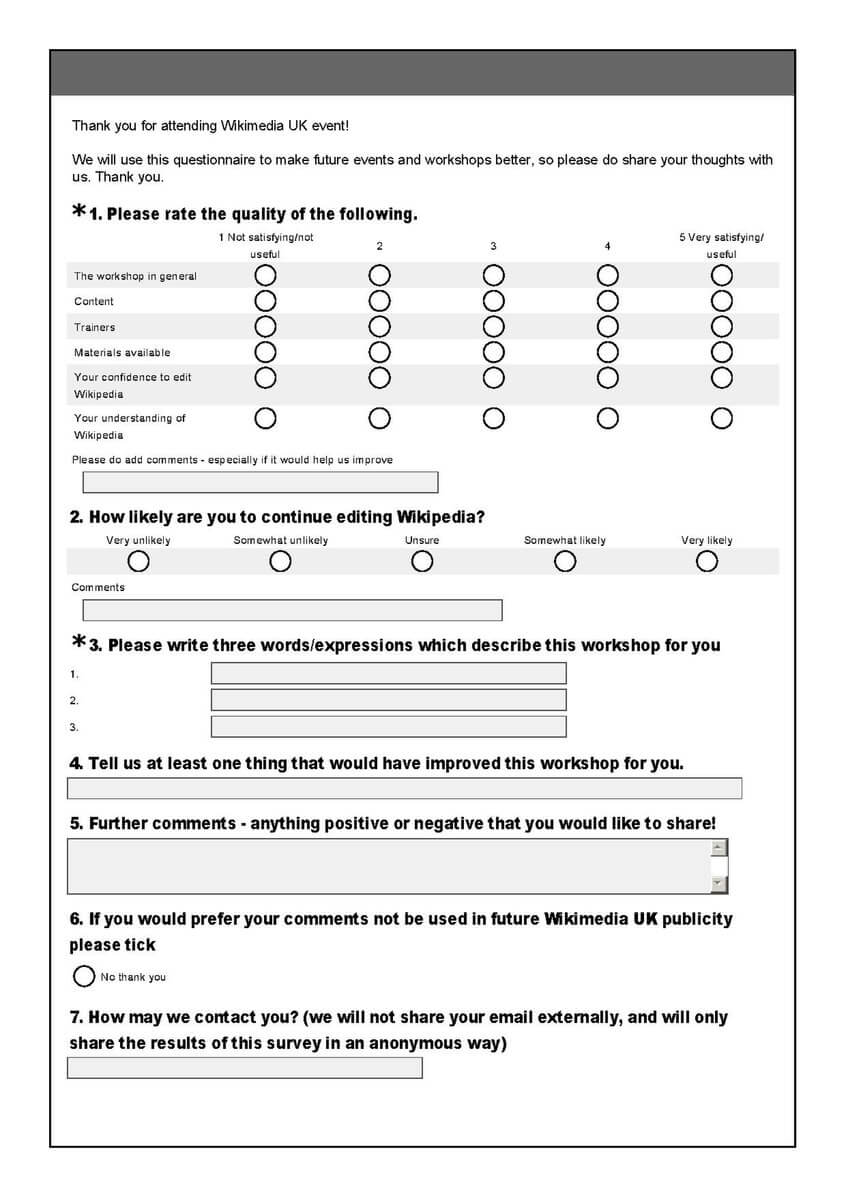
Source: commons.w ikimedia.org
Wikimedia is a premium Wikipedia event for contributors. This workshop and event are imperative as it keeps contributors abreast of best practices of editing Wikipedia and keeping the content accurate and informative. Hence, ensuring that participants in the event and workshop are fully aware of what needs to be done.
This post-event template covers all major aspects of the learning and willingness of respondents to provide content edits on Wikipedia. This survey has a good mix of qualitative and quantitative question types to get an in-depth insight into the effectiveness of the workshop and simultaneously also source testimonials.
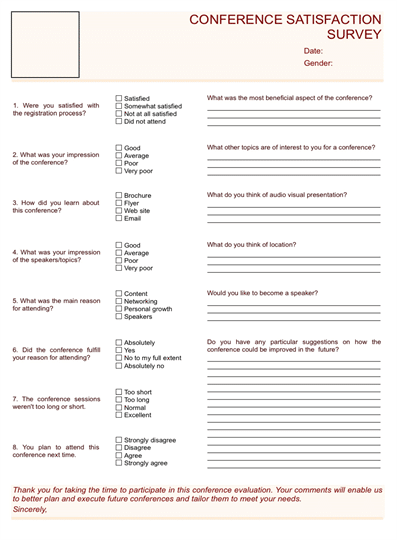
Formbox uses an extensive survey template to understand post-event satisfaction. This survey is divided into rating star questions and then a qualitative justification for those ratings. Various aspects are seen covered in this template that Formbox can use to categorize and analyze data as per important demographic information. The template is comprehensive and covers all important aspects of the event including where the attendees heard about it from, ease of the registration process, quality of speakers, quality of the content at the event and so and so forth.
The survey also aims to collect insights into if the attendees would attend the event in the future and also if there is a willingness to speak at subsequent events. Formbox can collect and analyze multiple imperative data points with the use of this conference satisfaction survey.
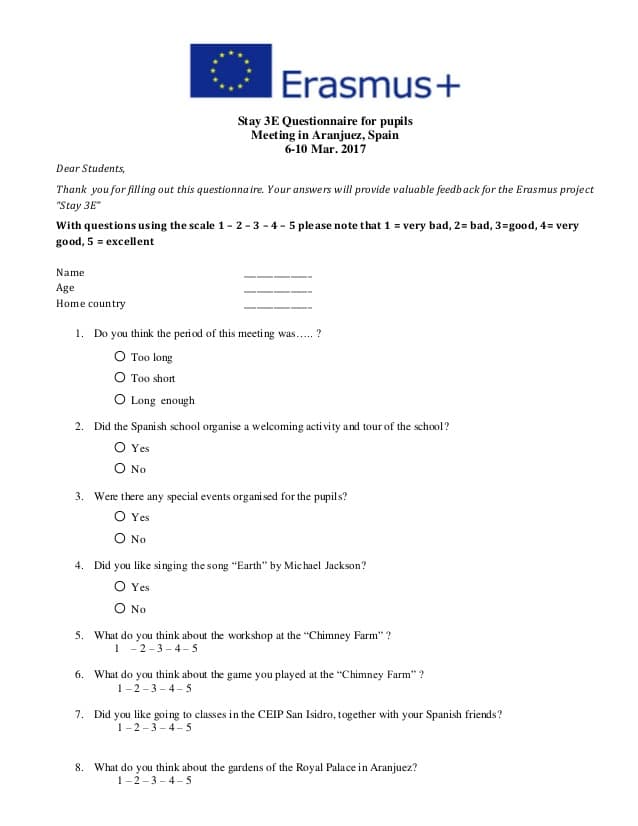
Erasmus + conducted a survey for an international learning field trip organized in Spain for students. If longer duration trips are undertaken for students, it is important to know of their satisfaction with the trip, did they learn enough, what activities were conducted, hospitality on the trip, feedback on the places visited, etc.
This survey template allows the children to rank their trip on a rating scale of very bad to excellent. It also aims to identify the underlying pulse and satisfaction with the trip on the ability to practice a foreign language, the students that were on this trip, the curriculum and activities. If these students are satisfied, they would refer this trip to friends and other members in their immediate ecosystem. Hence, collecting granular feedback is very important.
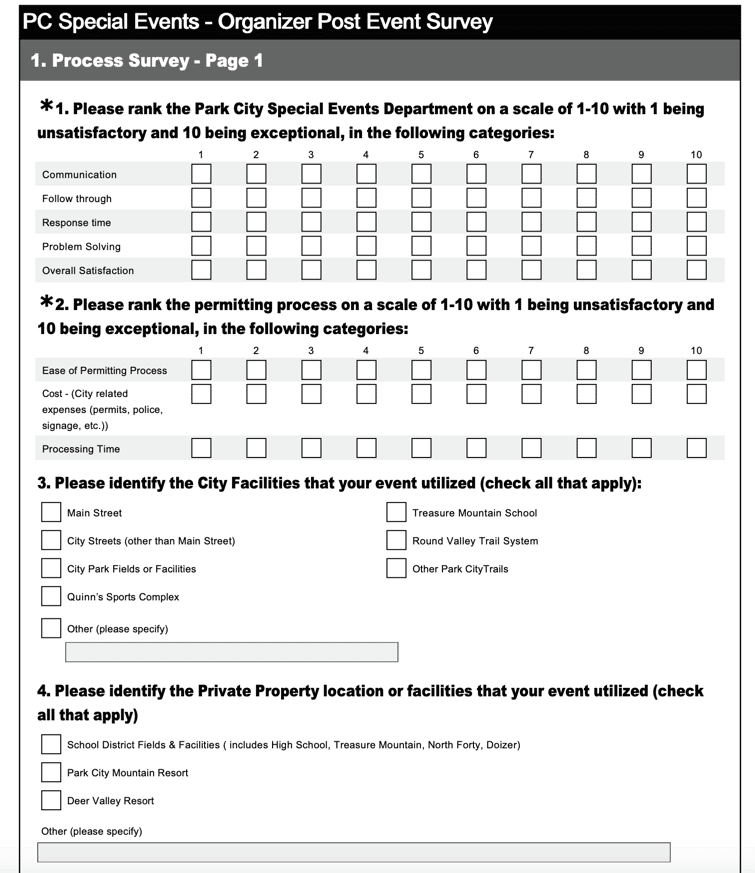
Park City consists of a department of events that permits residents and brands to conduct events in a certain county. When you let out an area for a fee, you want to be amply sure that your customers see value in what they are paying for and their interaction with you.
This survey template evaluates the department’s experience with dealing with an event on the basis of communication, response time, problem-solving ability and overall experience. It also aims to identify the gaps in the process of permissions, etc. take time to go through. The objective of the survey is that when an event is conducted, it is conducted in the best possible manner and what other aspects can be taken care of to make conducting the event as hassle-free as possible. This survey also aims to identify how easy or difficult it is to conduct an event in each area or region that is let out and then fix problems in the areas that are lacking.
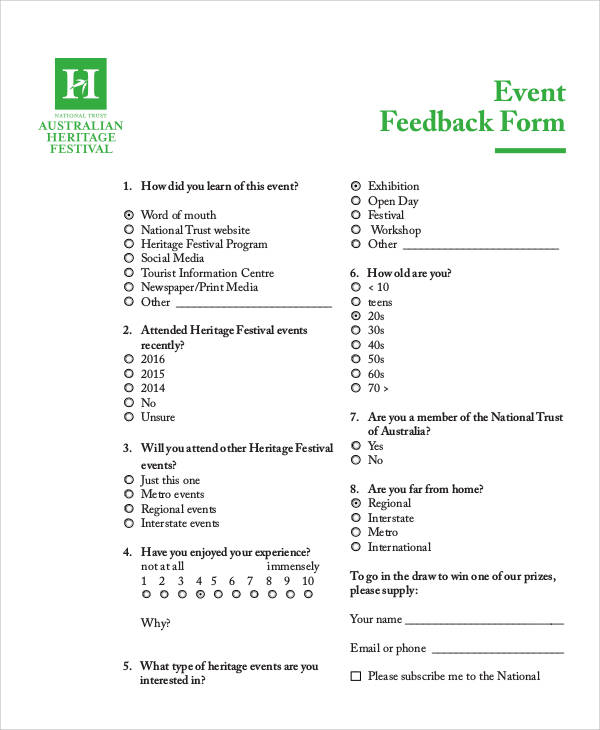
Source: s ampletemplates.com
The Australian Heritage Festival is an annual event that is conducted to showcase the heritage of Australia. The event attracts people from all over Australia, New Zealand and even overseas including Asia and Europe. This makes conducting feedback on the festival extremely important.
Conducting an event of this scale helps socio-economically and is also a matter of pride. It is important to identify the aspects of the festival that are really good and aspects that are lacking. The organizers also wanted to identify where people are coming from and what events resonated with them, their overall satisfaction and how often they’ve been before as well as if they would come back again. If you conduct an event of this scale, it is important to collect insights into every moving part of the event to make it as successful as possible and also motivate people to tell others about the event.
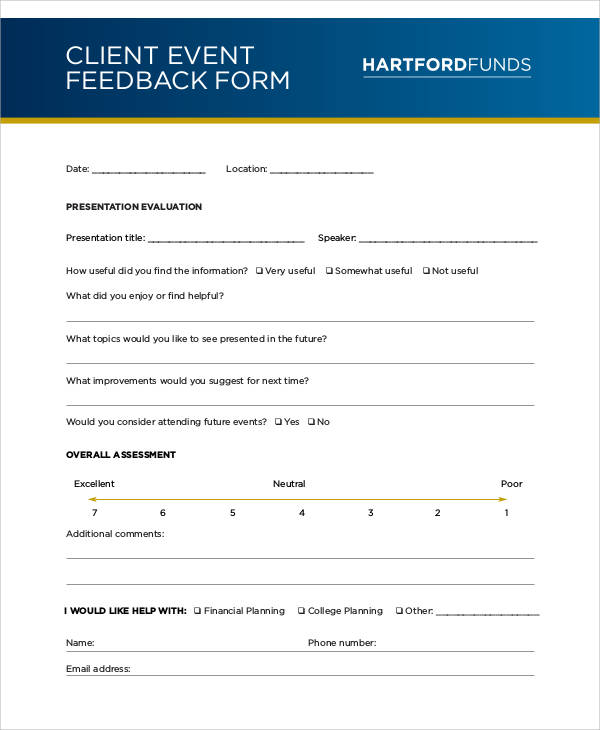
Hartford Funds conducts financial educational events for a wide range of audiences. This event is conducted very often with a lot of respondents and hence the need for collecting timely feedback from the whole audience. The questionnaire is designed to get a pulse of what areas of teaching work for the attendees and the areas that are lacking. It also aims to understand where and how the respondents plan to use this information. This helps in tailoring future programs and increasing their effectiveness and efficiency.
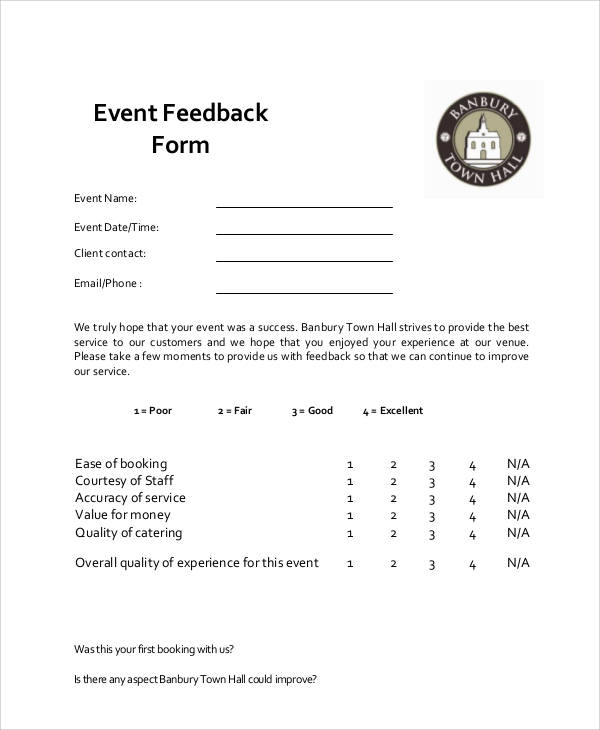
Banbury Town Hall lets out their premises for others to conduct their events in. But they do run a survey to the event organizers after each event to know how they fared with the whole process of letting out the premises and everything around it. This includes an evaluation into various aspects such as the ease of booking, value for money, the efficacy of the stuff, service and catering quality, etc. You can use this post-event template for your brand to identify gaps in service and product and fix them so that you become the choice of venue for any event.
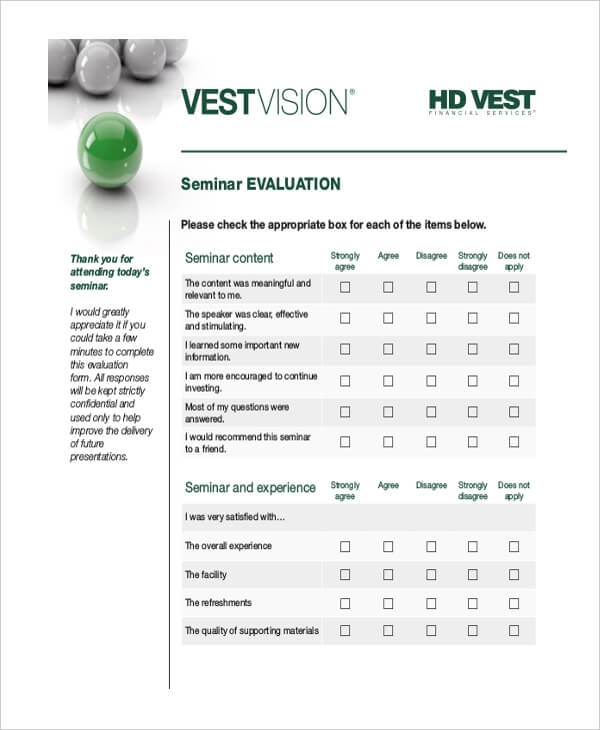
VestVision conducts financial planning seminars often and invites a number of attendees to these events. The objective of this seminar is to make people aware of how to manage their finances better. The questionnaire is designed to be very simple and lets people pick from an agreement rating scale on the quality of the seminar including the content, coaching, takeaways, course material and overall experience.
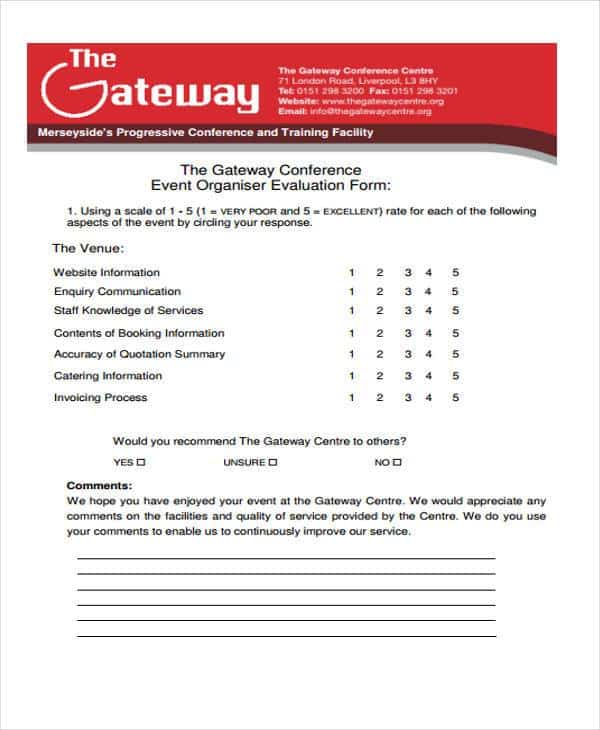
The Gateway Centre provides a state-of-the-art event hosting facility in Liverpool, UK. Post each event, they conduct a review of the facilities for their clients and the ease of using the facility, right from the time of booking to the day of the event. This questionnaire uses a mix of qualitative and quantitative questions to derive insights about their client satisfaction levels for each event conducted on-premise.
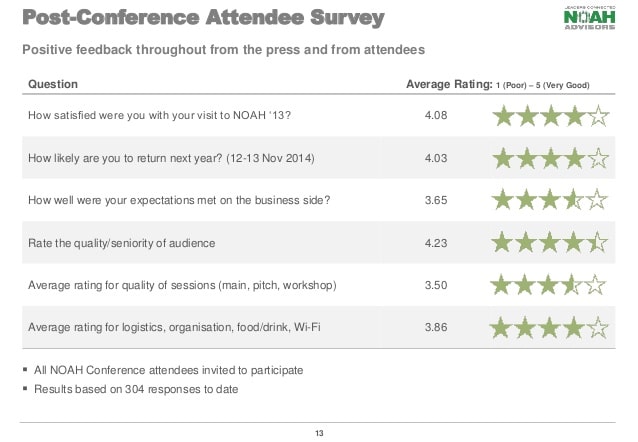
Noah Conferences have one objective, empowering the European Digital ecosystem. These conferences are conducted all across Europe and bring together attendees and exhibitors interested in the digital ecosystem. Needless to say, these events are very well attended and have a major impact on educating the European community on digitization. This questionnaire is developed to ask all major stakeholders of the event including exhibitors, attendees and staff, their take on the event and the steps to make it better.
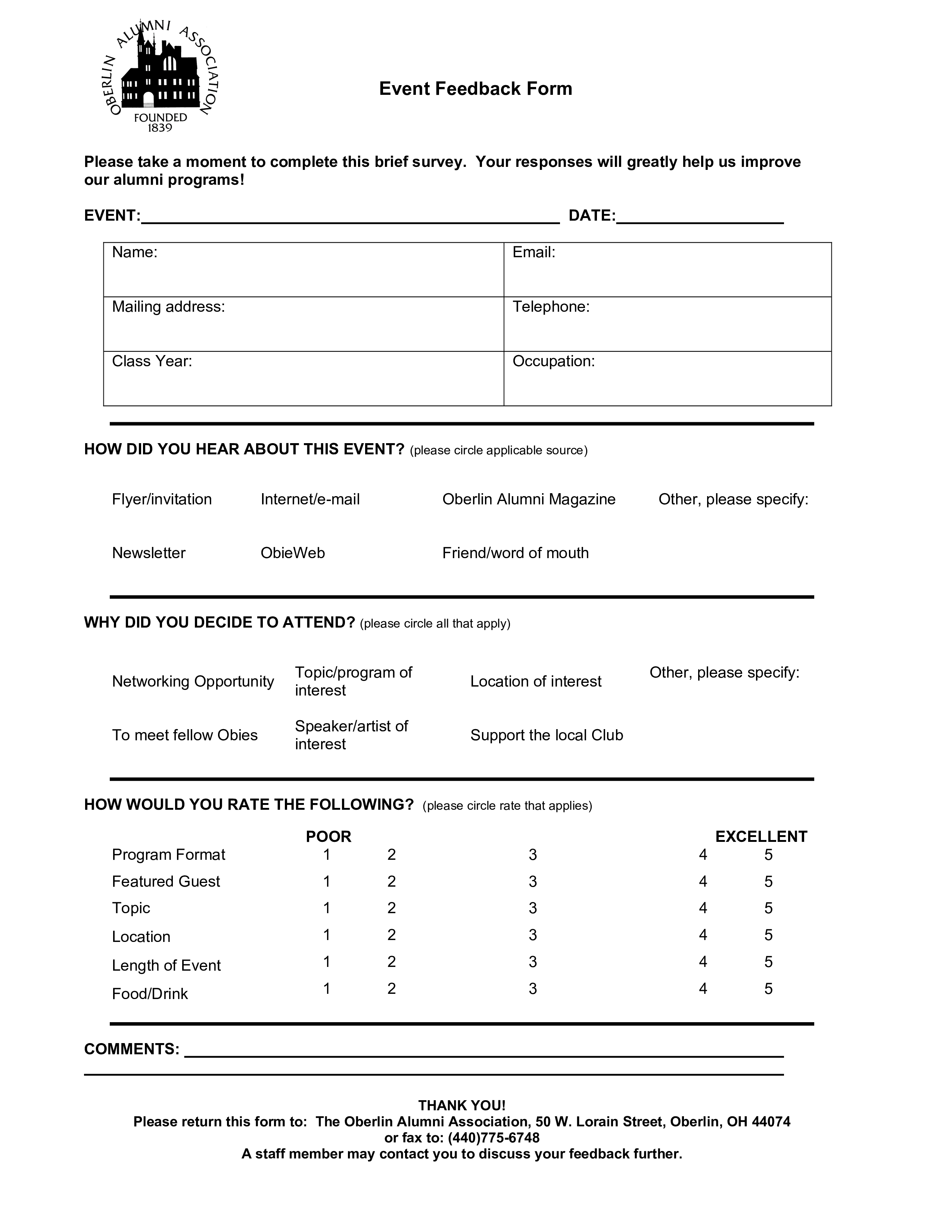
The Oberlin Alumni Association conducts events to bring together alumni to network, support local businesses and to disseminate information about a variety of topics. Since these events are open-ended, the association needed to get a pulse from the entire audience about what’s good about the event and what’s not.
In the event that your events are general networking events with no major theme of the event, this is a good post-event template to reference because it is generic but also helps with collecting the most important and relevant information.
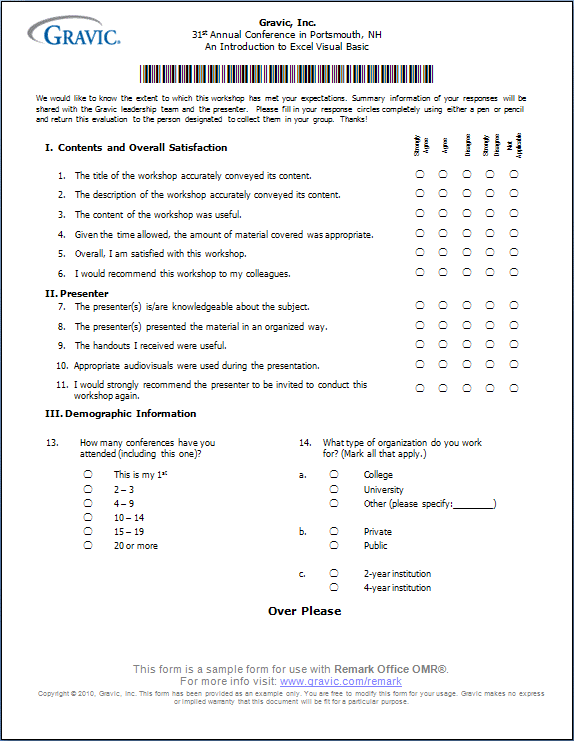
Gravic conducts a training session for VB and Excel. To know how effective the course, teaching and teaching methods are, a satisfaction survey is distributed among the attendees. These include core questions such as content and overall satisfaction and then also generic questions about the number of conferences attended in a year and the type of organization worked for.
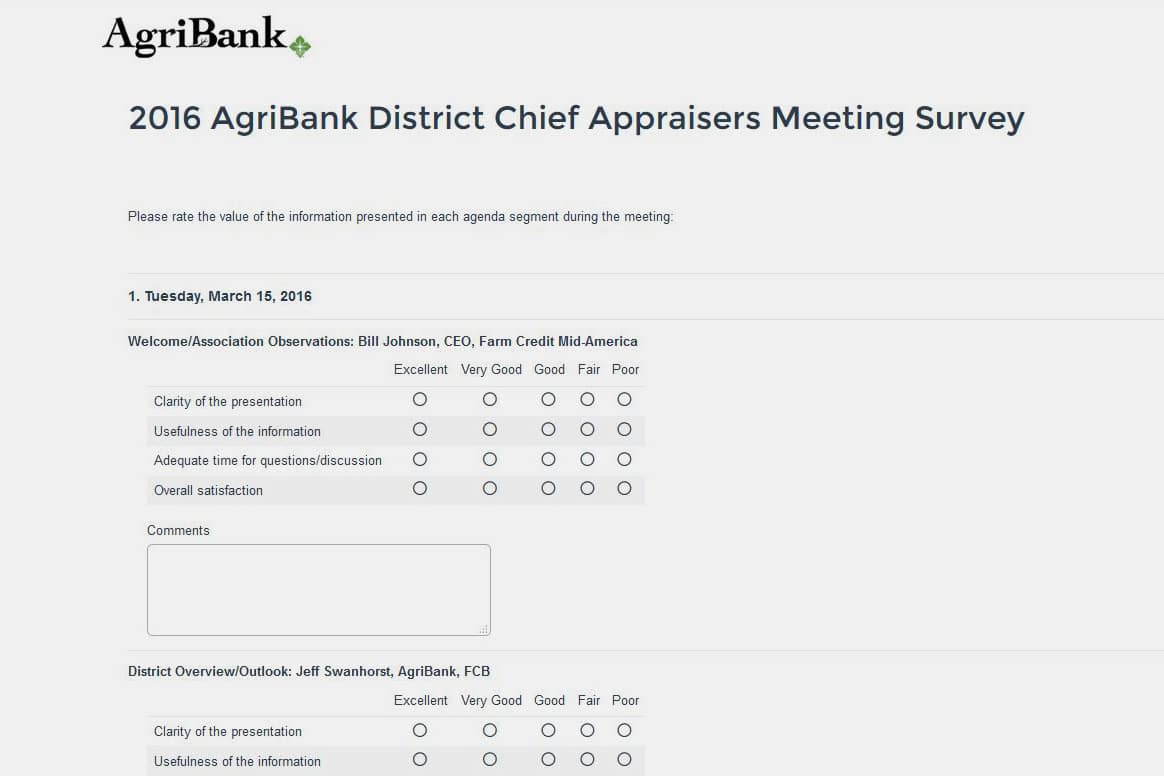
AgriBank, who provides financial solutions and funding to various farms credit associations in 15 states in the US, conducts an annual chief appraiser meeting. In this employee meeting, there are various discussions pertaining to financial discussions, a roadmap for the bank, profitability, CSR, etc. This event includes multiple presentations from various stakeholders. This post-event feedback form collects information about speakers, their presentations, clarity of thought, giveaways, etc. If you are looking to get in-depth feedback about various aspects of the event, this sample template form can be used.
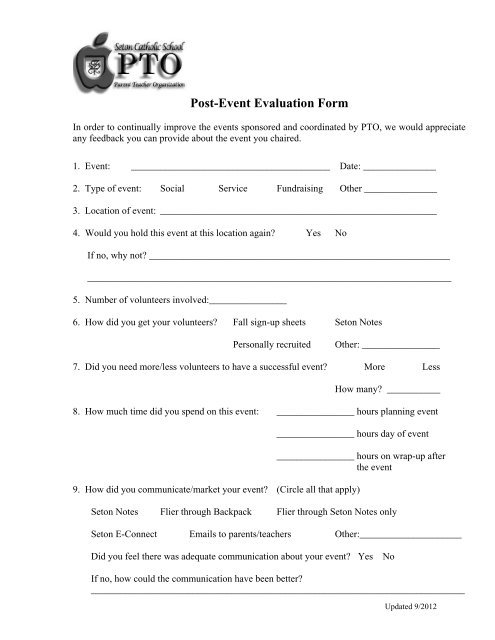
The Seton Catholic School conducts Paid Time Off (PTO) conferences on the school premises. This template aims to collect information about finer nuances of the event including various aspects like Marketing, location of the event, quality of the event, speakers, etc.
You can use any of these templates to carry out your post-event satisfaction surveys. But make sure you thank respondents for their participation, analyze the data and share the analyzed results across your organization. Collecting data and analyzing insights is fine, but make sure to act on those insights for the success of your brand and your event.
There are multiple stakeholders, in any event, be it internal or external. So how should you collect feedback from the event? There is no right answer because you need to collect feedback from all of them to get deep actionable insights into the event. The major stakeholders you need to collect feedback from post the event, however, are:
Attendees: The attendees form the backbone of the event and they constitute the most important faction of the feedback survey. The event was put together for them, so naturally, their opinion matters the most. You need to know how satisfied the attendees were with the event, major gaps they saw and what could be improved on.
Word of mouth marketing and referenceability are two important pillars that events are based on. You want to be sure that you hear from your attendees so that they come back to your recurring events and also spread the word and bring others along. For one-off events, you want to make sure that you get enough references to create a positive brand image.
Sponsors: People who contribute to your event in the form of sponsorships are looking for tangible returns on their investment. Unhappy sponsors rule the chance of them ever coming back and you also run the risk of negative publicity. Plus, it’s bad business ethics, right?
Conducting an event satisfaction survey with sponsors derives insight into the success metrics of the event – be in the form of attendance, participation, etc. Ignoring this aspect of your event can be detrimental to when you calculate the success metrics of the event.
Volunteers: Volunteers are important stakeholders of an event. They keep the event moving and are agile enough to deal with anything that happens due to the event. They form the backbone of the event and naturally, an important faction to administer the satisfaction survey. Volunteers can help you uncover insights into what worked and what didn’t, of actually managing an event. They provide an interesting but much-needed viewpoint to better management.
Core members: The team that puts the event together, right from planning to execution forms an integral part of the event. Collecting their inputs about what worked and what didn’t is imperative for the smooth running of the event in general. A satisfaction survey with these core members helps derive insight into any aspects that would need to be tweaked for better participation and a better outcome for the organization.
While the general consensus from the attendees may be either good or bad, it is important to know if the core members mirror those emotions. A consolidated consensus is more valuable than information in silos.
You do not want to miss any insight into the event, hence it is imperative that you interview the above four major stakeholder groups post the event to evaluate the event satisfaction.
As with developing any survey template, there are some major items that need to be kept an eye out for while developing this event satisfaction template. Surveys are one of the most powerful data collection methods and they can be administered at a point of experience or even after to derive the pulse of the event. But does when you administer the survey determine how the survey questions look like? Do you need to ask only quantitative questions? And what in the devil’s name do you need to do to deploy a successful event satisfaction questionnaire?
We’ve lined out five best practices and tips if you may, to create an insightful post-event survey:
Depending on the nature and type of your event, it is important to make sure that you have the correct question types in your survey template.